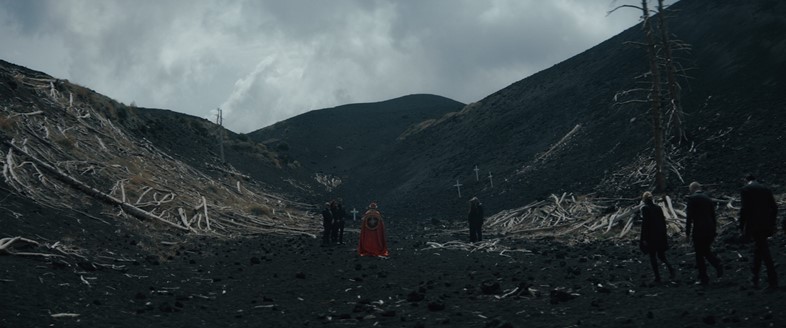As Distant Planet launches in Italy, we meet the director and visual artist behind it, Josh Blaaberg, who discusses the fantasy that defines this very Italian genre
- TextFrancesca Gavin
What happened when disco died? The dancefloors were there but people didn’t know how to fill them. In Europe, along came the synth sound of Italo Disco. Emerging British director Josh Blaaberg, was commissioned by Gucci x Frieze to make a 30-minute documentary about this genre titled Distant Planet, following films by artists Jeremy Deller and Wu Tsang.
Part memoir, part documentary and part fiction, the film is a brilliant take on Italo Disco’s history and legacy. Which is an interesting conundrum as Italo itself was a scene created on anonymity or disguise: it was made to order music, cheap and playful, while musicians were often replaced by models mouthing their songs on stage.
As the film launches in Italy, Josh Blaaberg talks to Another Man about the sweet poignant fantasy that defines this very Italian genre.
How would you describe the aesthetic and sound of Italo?
Josh Blaaberg: Italo means a lot of things to different people. It’s electronic music made in Italy in the 80s, often channelling the UK and US pop that we grew up with. Occasionally, the lyrics are written in a slightly garbled English, where the aesthetic of the words are more important than their dictionary definition. A playful relationship to aesthetic and artifice runs through Italo. The music has a distinctive poignancy to it that keeps bringing me back for more. It manages to sound happy and sad at the same time; nostalgic, hopeful, innocent and heavenly. There’s a melancholy to it; it’s very DIY but reaching out beyond the stars.
Fantasy was a huge part of the music and your film. What interested you about that idea of the unreal?
Josh Blaaberg: Life is a collection of stories, myths and lies which we tell ourselves, on both a personal and societal level. Italo evokes a strong sense of the uncanny because it is so close to British and American pop. This got me thinking about how we judge what is and isn’t real, how cultural hierarchies develop, and how fantasy is an inherent element of the human condition. A contributor in the film says that even though so much of it was fake, because everyone was prepared to share in the fantasy, for a moment it became real. I think that is so beautiful.
How would you describe their interest in the future? What did that look like?
Josh Blaaberg: The future is such a fascinating concept, and there’s nothing like an unrealised future to evoke a peculiar sense of longing. The 80s was a decade obsessed with it, and you can hear it in the sounds and see it in the cover art. I think their future was a place where everyone’s fantasies could become real. On a more emotional level, an Italo producer remarks in the film that when you’re young the future is necessarily filled with hope because everything is ahead of you. But I think there’s something more profound in their interest in the future. Is a sense of the future one of the core aspects of what defines us as a species? Without the ability to negotiate with tomorrow, or next year, there’s no way to impose our being into reality, if that makes sense? Often with Italo there seem to be almost ancient, elemental concerns holding everything together.

Why did you decide on the narrative structure you used in the film?
Josh Blaaberg: I wanted the structure of the film to reflect how I see Italo – a combination of parts which fit together under their own logic. I structured the film around a scripted story, made up of six chapters, taking three real Italo stars on a journey into the eternal. Around this fictional journey, I use interviews and voiceovers to join the dots between Italo and the themes that I feel it represents. The voiceovers are almost aphoristic, little sentences of emotion, anonymous, and extremely moving. I used this structure to explore my own feelings about life and loss. It’s almost an essay film hiding in plain sight, which itself seems quite Italo somehow.
How did Italo connect to ideas of luxury?
Josh Blaaberg: Italo was very much of that 80s conspicuous consumption mindset, but one with a strong sense of game playing. Dressing up and looking sharp for the weekend, before going back to a factory job on Monday morning. Luxury images often depict carefree young people caught outside of time, a utopian place where loss is overcome and we can be young, beautiful and with the people we love forever. I think luxury is a repository of our desires at any given moment, almost the religious impulse as manifested in media culture, and it’s extremely moving when we start to think of luxury in this way.
What do you think made the music and scene particularly Italian?
Josh Blaaberg: I think the sense of game-playing in the scene is very Italian, as well as a particular genius for melody. I also think that sense of nostalgia for something that can’t be named, that sense of yearning in the music, is deeply and beautifully Italian.











